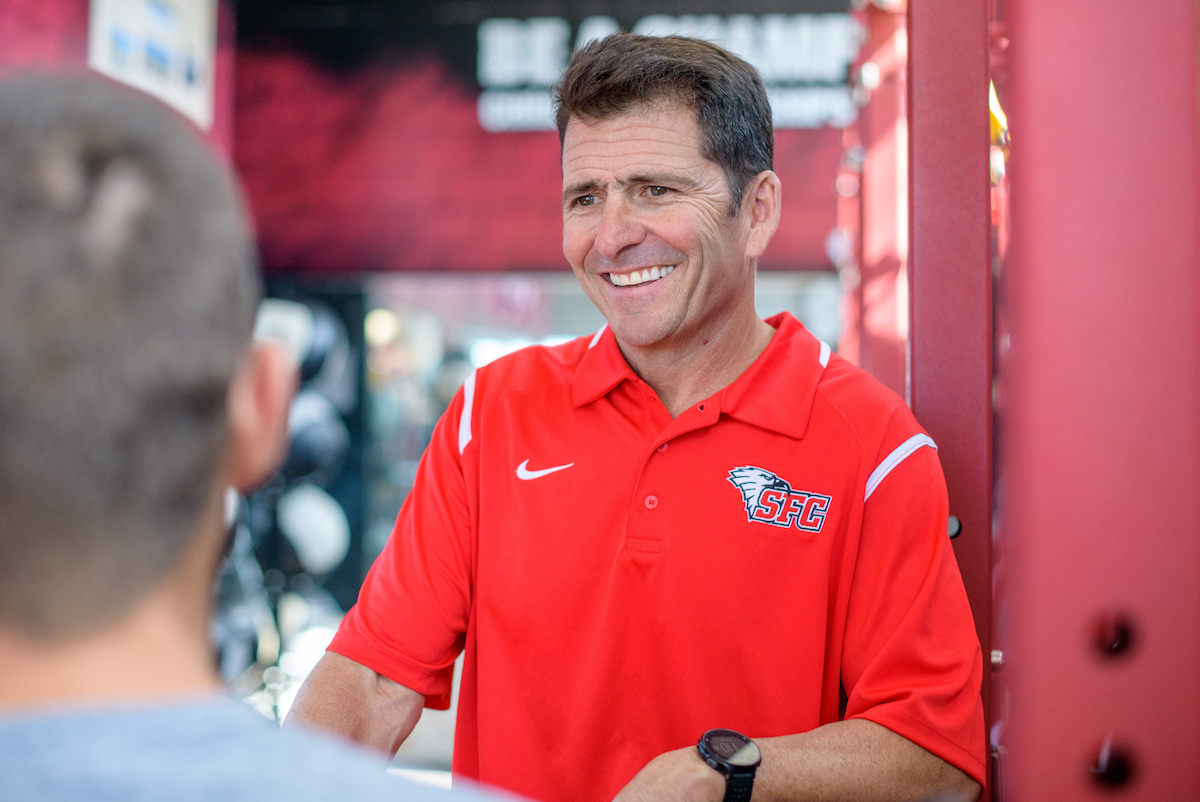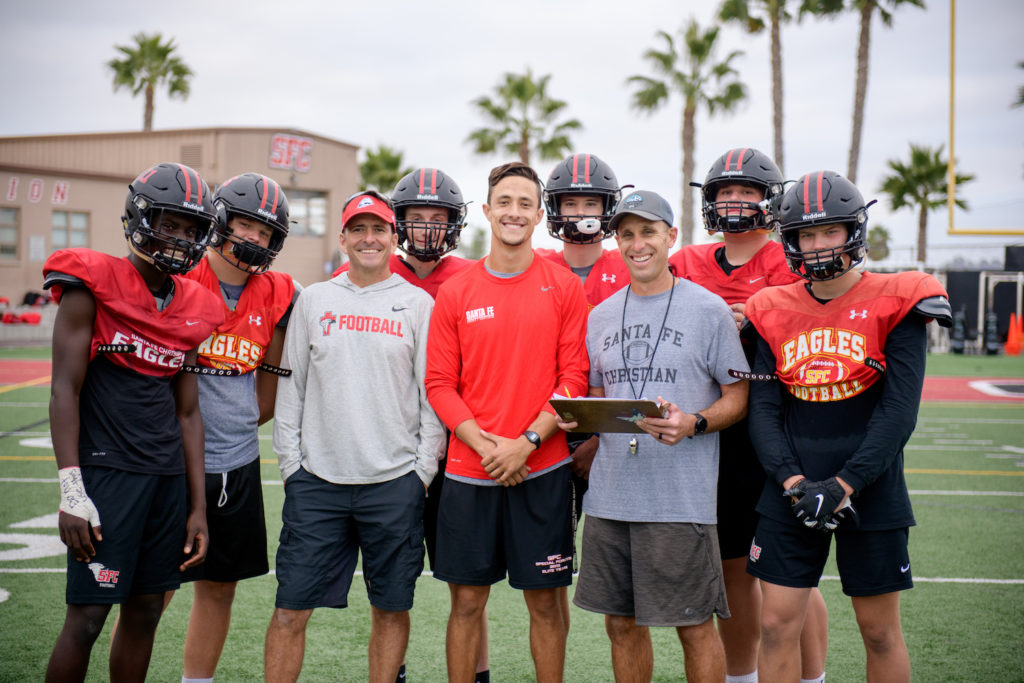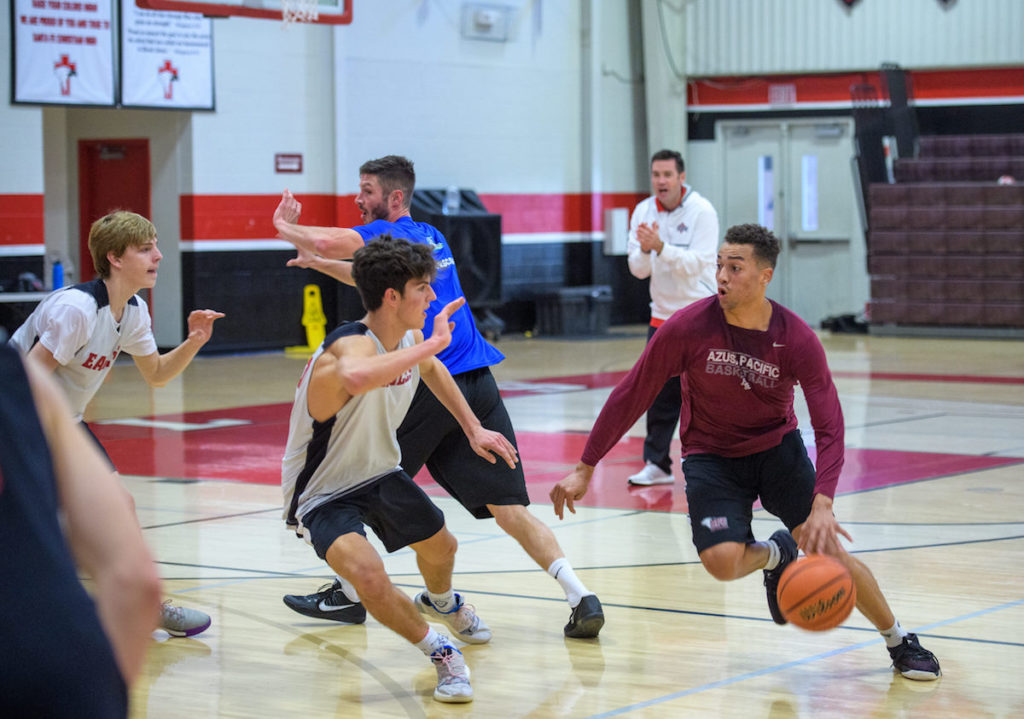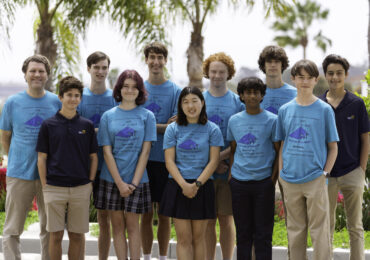“In athletics, it starts with a relationship. We love the athlete. We’re committed to the athlete. We’re looking at the whole athlete, not just on the field or the court, but looking at their heart, looking at them as a human in the classroom and where they’ll be next year,” says Athletic Director, Doug Miller — weighing-in on sports mentorships, where building character and integrity off the field defines success as much as on the field.
Sports mentorship begins with “letting the player know that we’re in this with them” which “allows for very truthful and loving conversations with athletes.” Outside of this, mentorships develop organically through the meaningful relationships coaches work to foster.
Interested in experiencing Santa Fe Christian? Let’s get to know each other.
Naturally, mentorship plays out differently depending on the age of the student. A student’s formal athletic journey typically moves from Middle School through High School. For each age range, “what the athletes are going through, the stresses in their lives, the pressure, the ability to listen, and embrace what’s coming out of the coach’s mouth is different,” Miller notes. Coaches tailor their approaches and interactions individually to each student.
Mentorship and faith
Creating “well-rounded, outstanding citizens” remains one of the ultimate goals of the sports mentorship relationship. Athletes and coaches are challenged to broaden their focus beyond themselves. “Every single day we are at the campus and we are demonstrating what our faith is.”
“[Faith is revealed] through, how we play, how we win, and how we lose. People are looking at us and they’re making a judgment. They’re forming an opinion. What is it that is unique about Santa Fe Christian? What is it that’s unique about those coaches or those athletes in victory and in defeat?” says Miller. Sports mentorships strive to infuse integrity into every corner of student-athletes’ lives.
By promoting spiritual development, mentorships also aim to build Christian athletes and effective Christian leaders. This happens “when God is first in everything we do,” Miller says. “We’re successful chasing championships. We want to compete with the biggest teams in Southern California or nationally, but it’s God first. In every aspect of our coaching, in our daily workouts, in our competition, in our recap, whether it’s a win or a loss. What was God doing in my heart? What does He want to do with us as a team?” Mentorships integrate questions like these into athlete-coach relationships.
“Our goal as coaches is to establish in our athletes and our parents’ eyes that God is very real. God has a role in our team and the individual heart of our athletes.” Coaches demonstrate this objective to student-athletes. Miller uses the analogy of David vs. Goliath. David, though labeled “unqualified” by others, sees what God has done in his life. He gathers the stones and runs into battle, alone, trusting God is with him.
Greatness beyond the game
Sports mentorships catalyze better Christian athletes and godly leaders starting with the way students view their skills, talents, and personal ethics. “‘Be a champion’ is SFC’s philosophy. Be a champion for Christ on and off the field. I’m going to embrace that and add to it,” Miller shares.
Mentorships encourage greatness which extends beyond the game alone. Miller raises tough questions to drive home his point, calling-out famous athletes who “are rockstars on a Saturday” but “incarcerated on Monday…They’ve compartmentalized what’s important in their life. God gave us amazing blessings and we’re saying, ‘I’m going to take those gifts and channel them only to athletics.’ That’s the wrong thing. God gave us everything and we’re going to honor him with everything.”
What does it look like to honor God with everything? Romans 12-1:2 instructs followers of Christ to, “offer their bodies as living sacrifices holy and pleasing to God.” Miller believes that this is how an athlete expresses complete worship to God. Sports mentorships teach student-athletes, “this is how an athlete, a middle or high school student tells God, ‘I appreciate what you’ve done for me and I’m going to give you my everything, on the court, on the field, in the classroom; relationally with you, God, or with my brother and sister, with my mother and father. It’s in all facets of our life.”
Investing in students
Loving others drives the heart of sports mentorships. Coach Miller has a reputation for his intentional investment in the lives of both staff and students. He encourages others to do the same, without overcomplicating it. “It isn’t really that hard because really, honestly, if you look at God’s commandment for us, we’re just called to love…Let’s keep it simple. We’re simply called to love.”
Miller explains how a culture compelled to love others becomes a gift that keeps on giving. “If we go out and love the way God commands us to, the joy that you receive in return makes you want to do it continually. How do you do it? Do it once and see what the byproduct is to yourself and then you do it a second time. You’re like, I could do this. I could do this in situations where it’s uncomfortable. I could do this every day.” Suddenly, “it becomes an addiction, loving others the way God wants us to love. That’s how we were designed…When you are in a community and you’re loving someone that is easy or hard to love, it feels really, really good and you want to do it over and over again.”
For Miller, who has coached at Santa Fe Christian for ten years, the “best gift a coach could receive is a call from a former athlete” reaching out in thanks or seeking advice for a defining moment. “What that tells me is we’re building real relationships. There’s real trust between our coaches and our athletes,” stretching into college and longer. At Santa Fe Christian, it’s a collective community effort, partnering coaches, students, and parents together “going after the young man or the young girl’s heart.” Trust, friendship, community, and character are some of the greatest rewards of Santa Fe Christian sports mentorships.

(Photo by Maddie Meyer/Getty Images)
Student-athlete perspective on mentorship
Alumni Jake Bailey underscores the value his Santa Fe Christian experience has brought into his football career, playing for the Stanford Cardinal and recently completing his rookie year with the New England Patriots. Bailey attended Santa Fe Christian from sixth grade through his senior year of high school, gaining “lifelong friends and mentors.”
SFC not only introduced him to his passion for football but also taught him, “how to be a good young man and push through adversity…Being humble and knowing that other people are out there on the field and doing a job that’s equally as hard as yours, that’s a big part of football.” Bailey says, “it’s easy in the NFL to get ahead of yourself and focus on lofty goals and stuff, but focus on the day ahead, focus on the task at hand, and you’ll be okay. That’s what’s special about the Santa Fe teachers and coaches. Football coaches show strong love, tough love, which is another form of love that God shows you. Makes you a better football player. Makes you a better man.”
Jake Bailey from We Are Kingdom on Vimeo.
He is grateful for the many teachers and coaches from Santa Fe Christian who continue to communicate with him or see him for coffee when he comes to visit. Bailey especially thanks Coach Nick Ruscetta for his mentorship and for helping shape him into the man he is today, “the work ethic he instilled in me and many other different characteristics…I went on to play professional football for the New England Patriots and still carry those same values that Santa Fe taught me. I just feel super grateful. Thank you, Santa Fe Christian. You guys are always in my heart. And I love you guys.”





